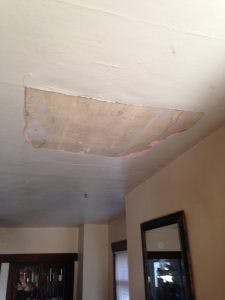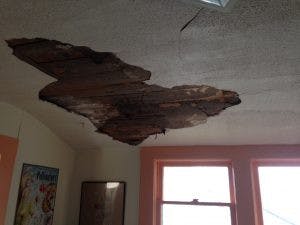Editor's note: This article is one of a series written based on public information requested from the City of Bellingham Planning and Development Department for data covering Bellingham rental inspections between June 13, 2016, when the city began the inspections, and Feb. 9. The data includes inspections in the York and Sehome neighborhoods and in part of Happy Valley. Other neighborhoods have yet to be inspected. The data is not inclusive of all inspections as many landlords opt to use private inspectors who are not required to file detailed reports with the city. Links to additional stories can be found at the end of each article.
By Erasmus Baxter and Alexis Edgar Amy Bohannan, a 27-year-old, unemployed York resident sits inside her bedroom fearing two things: being trapped by a fire in her rental unit because her window is too small to allow her to escape, and the possibility of eviction if she complains. Across town in the Sehome neighborhood, Bryan Couture, a 48-year-old displaced union carpenter, shares Bohannan’s fear of eviction should he complain about his landlord’s failure to address his concerns about the quality of repairs made in response to inspection results. Data obtained from the City of Bellingham rental inspection reports and interviews with more than 20 tenants living in 17 different rental units show a number of landlords are unwilling to maintain rental units, have been dismissive or unresponsive to tenant concerns and have made repairs in haste, leaving tenants dissatisfied. Some landlords whose units failed inspections were repeat offenders. The Bellingham Rental Registration and Safety Inspection Program, approved by the City Council in March 2015 and implemented in June 2016, requires all rental properties to be registered with the city. All properties with fewer than four units are inspected once every three years, with inspectors working neighborhood-by-neighborhood to fill out inspection reports and re-inspect failing properties. Properties with more than three units either have four units or 20 percent of total units inspected, whichever is greater. City of Bellingham Planning and Development Department data from the first round of inspections show that 436 units, or 38 percent of all properties inspected by city inspectors, failed their first inspections. This includes data from the York and Sehome neighborhoods, as well as part of the Happy Valley neighborhood, the first areas to be inspected under the new program. Data released by the city does not include inspections done by private inspectors, which landlords can elect to have completed by a city-approved inspector, for a fee. Although the Washington State Residential Landlord-Tenant Act requires landlords to maintain properties to a certain level of health and safety codes, inspection results and interviews with tenants show many landlords have fallen short. Tenants confronted by either unresponsive or hostile landlords say they have accepted substandard conditions, often because they can’t afford to move or can’t find another rental. Although they are required by law to address the issues raised in rental inspections, the city’s inspection data shows that some landlords have refused to comply despite risking a fine of up to $200 a day, which increases to $500 a day after 10 days of non-compliance.
Landlords unresponsive and dismissive of results
Some landlords have been dismissive of issues tenants raise, even in cases where tenants’ concerns were confirmed by inspection results. Landmark Property Management, the property manager for 1540 Humboldt St., in the York neighborhood, dismissed the claims of a failed inspection. Brianna Williams, a property manager assistant at Landmark, said in an interview, “the property at 1540 Humboldt St. passed the rental inspection,” although she could not comment on the details. The city inspection report shows the property failing inspection twice, and upon examination of the property and tenant testimony noted by the inspector in his report, no changes have been made. The inspection report described a gas room-heater plugged into an extension cord, exterior fire hazards and the lack of an egress window in the tenant’s bedroom, meaning the window was too small to climb out of in case of emergency. The report also called attention to issues in the basement. “Sump pump is present in a bucket, wired into light bulb receptacle wired through ungrounded means, discharging through garden hose routed through door and up the stairs,” city inspector Rob Barker’s report notes indicate. Bohannan is the tenant concerned about the issues raised in the inspection. “I really hope we don’t have a fire, because I’m going to die,” Bohannan said.“Our bathtub, when we first moved in, had sewage coming out of the drain. My mom called and they were just very defensive and rude and didn't get back to us about the issues.”
Kyla Sumpter, Western senior and former York district renter
Bohannan said the property management company has failed to respond. “They haven’t done anything yet. We keep telling them. The inspector even said that the bush growing up over the roof is a fire hazard, and I can’t escape,” Bohannon said. “My main concern is with Landmark. Will they kick us out if we insist on the repairs or not give us suitable housing to make the repairs?” Issues of unresponsive landlords appeared in several places in the city data. In the first few months that Western senior Kyla Sumpter lived in her house in the York district in 2015, she estimates that she and her roommates tried to contact their landlords 10 to 20 times. “Our bathtub, when we first moved in, had sewage coming out of the drain,” Sumpter said. “My mom called and they were just very defensive and rude and didn't get back to us about the issues.” It took a month for the landlords to send someone to look at the shower, by which time they had managed to clear it themselves, according to Sumpter. During that time Sumpter and her roommates had to shower elsewhere. While they also had issues with mold, insects and a collapsing shed, they eventually gave up trying to reach out to their landlords. “We realized they were unresponsive, and there was just so many issues that needed to be addressed, that we felt apathetic towards the end,” Sumpter said. Sumpter’s rental is one of the 24 rental units in Bellingham registered to Kerr Properties, LLC and Kerr Properties and Investments, LLC, both governed by Robert and Brenda Kerr, according to state records. Of those properties, only three passed initial rental inspection. Inspection data noted problems ranging from broken windows, to unprotected wiring, to a stove plugged in with an extension cord. While some issues noted easy repairs, such as missing handrails and insufficient carbon monoxide alarms, 20 of the properties were cited for multiple violations. “Their nicknames were ‘The Slumlords’,” Sumpter said of the Kerrs. “They lived in a [nearly] $2 million house but they couldn't keep up on their properties.” Snohomish County property records show that Robert H. Kerr, Jr. and Brenda L. Kerr own a historic, waterfront mansion in Everett. It is currently valued by the Snohomish County Assessor’s Office at $1.4 million. A 2006 article in The Seattle Times noted the mansion’s mirrored entrance hall, ballroom, conservatory and billiards room. In 2012, Robert Kerr was fined $21,800 by the Environmental Protection Agency for failing to notify tenants in 26 of the Kerr’s Bellingham rental units of the presence of lead paint as required by law, according to a May 2012 consent agreement with the EPA. As part of the consent agreement, Robert Kerr agreed to begin notifying residents of lead paint. While Bellingham’s rental registration program does not test for lead paint, current residents of properties owned by the Kerrs said they believed they had been notified of the presence of lead paint when signing their leases. Robert Kerr did not respond to three calls seeking comment over a three-day period.Landlords unwilling to follow rental standards
Overlooking Bellingham Bay, just above Boulevard Park, is 200 Pine St., a 100-year-old craftsman home that has been converted into a rental duplex. On paper, the home sounds idyllic, but in reality, the unmaintained property is concerning neighbors. “I wish the [owner] would do something about fixing the place up. It could be a really nice piece of Bellingham history, but it’s an eyesore,” neighbor Jim Walsh, 36, said. The duplex, listed on city rental registration records as held by World Domination, LLC, is in disrepair, according to the rental inspection report. Rental inspector Barker noted in his report that there were “several large openings in basement walls, vegetation growing through walls and framing members […] visible evidence of rodent intrusion.” Barker was not able to complete the inspection due to the thick growth of vegetation on the west-facing exterior of the property. James Twining of World Domination LLC has owned the property for two and a half years. He said that the inspection results did not worry him. “If an inspector cannot walk through some bushes, I’m not very distraught about that,” Twining said in an interview. “As you may have noticed, the place is basically a slum.” Twining has since said that he plans to sell the place and therefore will not comply with any of the rental inspection standards. Bob Lyon of Oceanside Properties, LLC owns seven properties in the York and Sehome neighborhoods. Inspection data shows his properties suffered from deteriorating flooring, hazardous concrete steps, inoperable toilets and lack of permanent heat, among other issues. The city inspector’s report indicates Lyon told the inspector that “some of these corrections are ‘ridiculous’ and he won’t be making them […] won’t spend thousands of dollars to meet program requirements.” Lyon did not reply to four phone calls made over a 10-day period asking for his comments.Tenants often dissatisfied with repairs
Tenants interviewed for this article said they have witnessed hasty, inadequate repairs being made in attempt to correct the issues presented in the inspection reports. The residents of 908 Key St. in the Sehome neighborhood, are just a few of many Bellingham renters that say they are not confident with the safety of the repairs being made on properties that have failed inspections. “[Landlord Wayne Chin] has his buddies come out, and work on the place, but they don’t do it right,” Couture said. Couture pointed to floor joists that were replaced with twine and staples and fastened to burned wood beams, as well as insulation installed upside down. Although the property passed re-inspection, Couture is not satisfied with the repairs made, and has voiced his concerns to Chin, his landlord. The repairs made to the water heater and electrical panel were not done in a manner that facilitates easy use, Couture said. “Anytime you leave this breaker on and run the dishwasher upstairs, now, it flips the whole damn thing. I have to buy $9 fuses every time it blows now. It’s not difficult to replace, but it could be fixed by repairing it properly,” Couture said. Chin did not return several phone calls placed to the number listed on his rental license.
Landlords repetitively noted for infractions and failure to notify tenants
The city’s inspection reports show a significant number of property owners have failed inspections repeatedly. In addition to the failed inspections, many landlords also consecutively failed to notify tenants of inspections.





